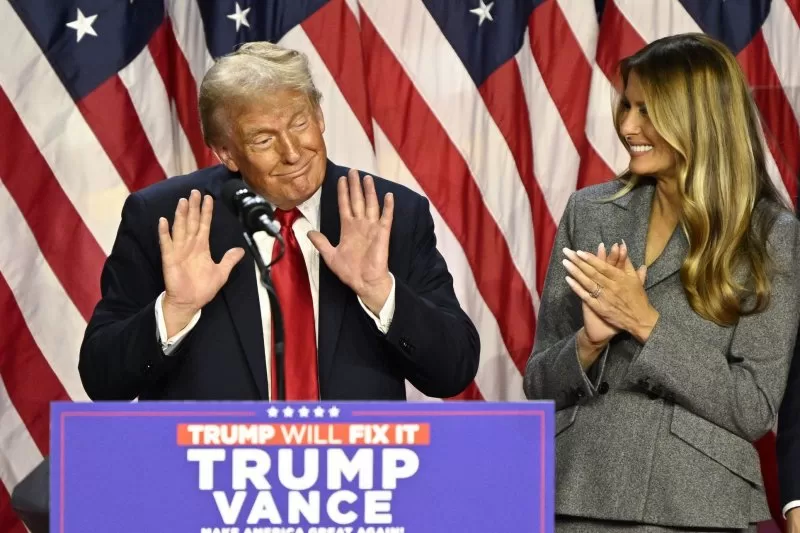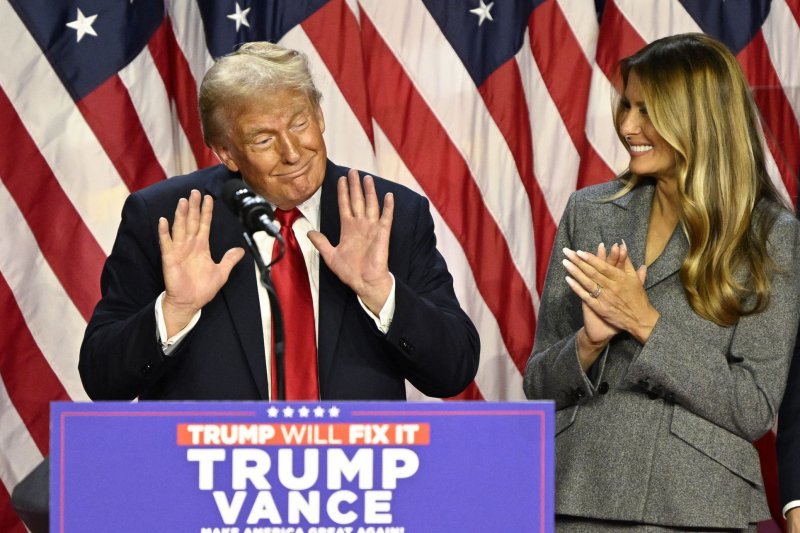Former First Lady Melania Trump listens as former United States President Donald Trump delivers a speech from the Palm Beach Convention Center at the Trump Campaign Election Night Watch Party in West Palm Beach, Florida on Wednesday, November 6, 2024. Photo by Joe Marino/UPI |
License PhotoNov. 8 (UPI) — Northeast Asian countries are bracing for changes that might follow as President-elect Donald Trump returns to office.
During his campaign, Trump pledged to upend what he described as unfair trade practices and decrease military involvement overseas.
Among his campaign promises, Trump said he would introduce blanket tariffs of 20% on all foreign imports and up to 60% or more on goods from China.
Blanket tariffs, even at lower levels than Trump has proposed, would certainly cause great volatility within China. They would also create volatility, however, for closely allied countries such as India, Japan, and South Korea.
During the campaign, Trump said that, as president, he would impose 100% tariffs on cars produced in Mexico and exported to the U.S. Japanese automakers that manufacture cars in Mexico and export the majority to the U.S. — more than 80% in the case of Honda– will be put in a difficult position.
Approximately 88% of vehicles produced in Mexico are exported. Of those exports, about 76% are destined for the United States.
Another dynamic that would affect the region is Trump’s aversion to U.S. involvement in overseas defense arrangements in which he considers the United States is getting a bad deal. Trump often has said that the United States should not protect allies who do not pay a fair share of their own defense.
“‘You didn’t pay? You’re delinquent?’ ‘No I would not protect you. In fact, I would encourage them to do whatever the hell they want,” Trump said at a campaign rally in South Carolina earlier this year.
“You gotta pay. You gotta pay your bills,” he added.
“There are some very specific issues where you can feel the way in which [Trump] looks at our allies, and he looks also at this idea that we have to renegotiate the basis of our postwar relationships with allies, both in the trade sense and in the security sense,” said Senior Fellow for Asia-Pacific Studies at the Council of Foreign Relations Sheila Smith in an interview with UPI.
“It’s a different world today than it was in 2016, and China looms large in the Indo-Pacific,” she added.
“Chinese behavior has also been much more assertive, and not only in the South China Sea and in the East China Sea, but in and around Taiwan.”
In his campaign, Trump was particularly critical of U.S. involvement in Ukraine and the imbalance of U.S. contributions to allies to fight Russia.
In Northeast Asia, however, the dynamics are different and the amount that countries such as Japan and South Korea contribute to their own defenses is high.
In 2022, Japan passed an agreement with the United States to spend $8.6 billion during five years on hosting American military personnel there.
In October, South Korea announced it would be paying $1.12 billion in 2026 for hosting U.S. troops, up 8.3% from 2025.
The United States has more than 28,500 troops stationed in South Korea and more than 55,000 in Japan, respectively.
The support of the U.S. military has been viewed not only as an insurance policy, but an essential foundation for maintaining a status quo of peace in the Asia Pacific, with no clear alternative of doing without it.
Australia and India’s foreign ministers said on Tuesday, before U.S. voting closed, that they were confident the Quad group of the U.S., India, Australia and Japan would continue to cooperate in the Indo-Pacific region regardless of the outcome of the U.S. presidential election. As a protective measure before the election, South Korea and the United States signed a defense cost-sharing deal on Nov. 4 to ensure the stability of U.S. troops stationed in South Korea, no matter who won the election.
The decades-long U.S. military alliances in the Asia Pacific are unlikely to go anywhere. However, the conviction that allied countries in the region can no longer rely exclusively on the United States for their national and regional defense is likely to deepen.
Japan, for example, will likely continue along the path of remilitarization while continuing to work closely with the United States and other allies.
“I don’t see this as a move towards independence,” said Smith.
“I think the allies are trying to meet the United States halfway, so to speak, to say ‘OK, we’ll do more. We’ll add to our capabilities, will enhance our abilities, and will integrate those capabilities with the United States to make it a seamless deterrent so that we’re both working towards this goal of making sure that no aggression is directed at us.'”
Japan has been constitutionally prohibited from having a military with offensive powers since the end of World War II. Revising the constitution to allow for this has been a major goal of Japan’s Liberal Democratic Party, whose members feel that Japan’s wings were clipped when Japan surrendered.
These views have divided the Japanese public, however, a majority of whom has, for decades, strongly supported Japan’s pacifist constitution. According to a May 2024 survey by the Mainichi Shimbun newspaper, only 27% of respondents said they were in favor of revising Japan’s constitution, which remains the oldest unamended constitution in the world.
As tensions with North Korea have risen and trust in the reliability of the U.S. nuclear umbrella has lessened, the debate in South Korea over developing its own nuclear deterrent has gone mainstream. A June survey by the state-funded Korea Institute for National Unification (KINU) found that 66% of South Koreans support their country having its own nuclear weapons.
The need for a deterrent like this, however, would be lessened if the threat of the DPRK were diminished. Trump said little on the campaign about how policy on the Korean peninsula might shift but frequently mentioned his special relationship with North Korean leader Kim Jong Un. Trump was the first U.S. president to meet with a leader of the DPRK. If progress could be made with North Korea in spite of wars in both the Middle East and Ukraine, tensions between North and South Korea could potentially see a cooling.
But much remains uncertain. Both friends and foes in the Northeast Asia region will be watching closely, and with some concern, to see what policy direction the second Trump administration will take.
“‘Why don’t you do more for your defense?’ This has been a pretty consistent theme in postwar American foreign policy towards its allies, including Japan and South Korea,” said Smith.
“But ‘Why don’t you defend yourself?’ is a different tone coming out of an American president.”
How much of what was said on the campaign trail will be enacted in policy is something that Americans and the rest of the world will discover in the following months.

